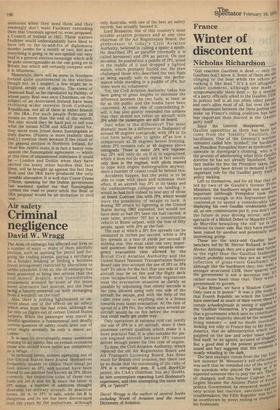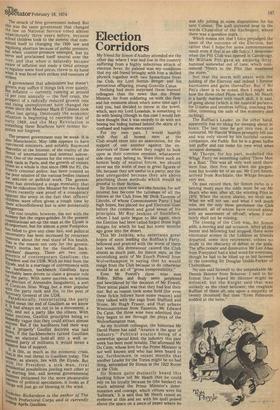France
Winter of discontent
Nicholas Richardson
"Gut reaction Gaullism is dead — only th„e, Gaullists don't know it. Some of them are st"' clinging to the boat while the others are rocking it like mad.It's a not altogether unfair comment, although one made symptomatically these days — by a memboet of a party officially allied to the Gaullist Up' In politics hell is all too often other people. and one's allies most of all, but over the last year dissension between the three parties that make up France's ruling coalition has been less important than discord in the Gaullist party itself. Since the General disappeared, such Gaullist opposition as there has been lit!: come from the 'historic' Gaullists, hardliners. One of the General's wartin% ministers called him 'symbol'; the hardlihec:, see President Pompidou more as syndrome, a" apostate in Auvergnat's clothing, who is the process of adulterating what little Gaulhs,! doctrine he has not already liquidated. Sitic` they dislike the line the President takes, the2 have naturally been driven to demand a roci'," important role for the Gaullist party itself policy making. Left to themselves, and for all that they are led by two of de Gaulle's former Print e Ministers, the hardliners might not seem 0° important (although Pompidou took the seriously enough in his SeptemberPress conference to spend a considerable Otte displaying his own Gaullist credentials). After, all, as one commentator put it, you don't rev the future in your driving mirror, and the spectacle of a Michel Debr6 or Maurite Couvet de Murville bewailing the old 'un is without its comic side. But they have recenoY been joined by another and potentially 111°re interesting group. These are the sixty-odd Gaullist backbenchers led by M. Hector Rolland, le brave, Hector. Although they are a good deal furthe' to the right than the Gaullist leadershi?, (which probably means they are an accurat'd reflection of grass-roots Gaullism), ara although like the hardliners they, too, wan'th stronger structured UDR, their quarrel the government is not a doctrinal one. Ito rather more basic than that. They wan' government to govern. "Like Britain, we have a Shadow Cabihet; Only ours is in power." It was a jibe made as' that Fourth Republic on which the Gaulh", have exercised so much of their verve; there'sto` certain schadenfreude in seeing it apPlieci the Gaullists themselves. It's perhaps neon', that a government which sees its constitueric_) as the silent majority should be the noisiest ,U1, living memory — and no doubt inevitab',5 looking not only to France but to Mr America, that that an administration which paigned on the law and order issue shot, find itself, or its agents, accused of illegalit!,5 But a good deal of the present governruell'is sound wh u suggests dark. this noisin
m ess
usntd and ng in h u suggests dark. this noisin
m ess
The best example comes from the top. ...„t last summer M. Messmer's self-effacerlui.:, was such that he reminded one of the actfillPe the anecdote who played the king as ;t expected someone else to play the ace. Then. 11'e all changed, and this former Captain in _to Legion became the Ancient Pistol of Freunot politics. Government, he reiterated, meant• r/ t t.s t.s only action but reaction, sanctions agui.o troublemakers; the Fifth Republic wasno`_st, be overthrown by street rioting or irresP°" ble firebrands.
The smack of firm government indeed. But this was the same government that changed the law on National Service voted almost unanimously three years before, because school children took to the streets; that committed itself to changing the 1920 law and legalising abortion because of public pressure, but when counter-pressure emerged, lost its nerve and proclaimed itself neutral over the vote; and that when it belatedly became aware of inflation and made a timid attempt to regulate some food prices, threw in its hand When it was faced with strikes and rumours of Strikes.
A government that administers but doesn't govern may suffice if things tick over quietly. out inflation — currently running at around 12 per cent annually — the fuel crisis, the Prospect of a radically reduced growth rate and rising unemployment have changed the scene since the Messmer Mark II Cabinet took Office last spring. Ominously the economic situation is beginning 05 resemble that of early 1968: and the May Revolution is something these Bourbons have neither forgotten nor forgiven.
• The present government may be weak. It is also Manicheistic. May 1968 appears to have convinced ministers, and notably Raymond Marcellin at the Interior, of the reality of the threat of international and internal subversion. One of the reasons for the recent rash of bank raids in Paris, and the growth of violent cj'me as a whole is that since 1968 the PJ, the vrench criminal police, has been treated as the Poor relative of the various bodies trained for anti-riot or political work. The government has developed a siege mentality that ay be ridiculous (the Minister for the Armed orces recently saw proof of a conspiracy against the army in the fact that officers' children were often given a tough time by their schoolfellows) but is also potentially dangerous.
The real trouble, however, lies not with the Monkey but the organ-grinder. In the present
epristit nal utio set-up the man at the Elyse is 4,11-important, but for almost a year Pompidou nas failed to give any clear line, and political uncertainty has been increased by recurrent Ittimours about the real state of his health. miss is the reason not only for the govern
ent's inertia but for the Gaullist backuenchers' disarray. There are two coin11:,11?nents of contemporary Gaullism: the
esident and the UDR. With no lead from the LlYsEce, and in a marriage of convenience with .,11e hardliners, backbench Gaullists have cuevitably been driven to claim a greater role Tr the party. With some success, as witness Ln_e election of Alexandre Sanguinetti, a sort °I. Corsican Silas Wegg but a man popular 1,s1lith the party rank and file, to the post of erscretary General of the UDR. aradoxically, restructuring the party inuld mean the end of Gaullism as we know ,It had always set out to be a movement, a satIY, and not a party like the others. With blifle success, Gaullist principles being so a essedly vague that they could attract almost ,flYone. But if the hardliners had their way 7:111d a 'properly' Gaullist doctrine was laid fr°2'vri, if the backbenchers turned Gaullism p'in an electoral hold-all into a well or6,......ar11sed party of militants it would mean a "r.sive loss of support. thtt is this, as much as the economic crisis, a„at is the real threat to Gaullism today. The ,ver, as always, lies with the Elyse. But ,„Ith the President a sick man, rival ri;esidential possibilities jostling each other at e starting line, and normal governmental Das"siness jettisoned for the more pleasurable niinle of political speculation, it looks as if "gs will just go on blowing in the wind.
Nich ,
P
°las Richardson is the author of The Jench Prefectoral Corps and is currently ting Apres Gaullism.



































 Previous page
Previous page